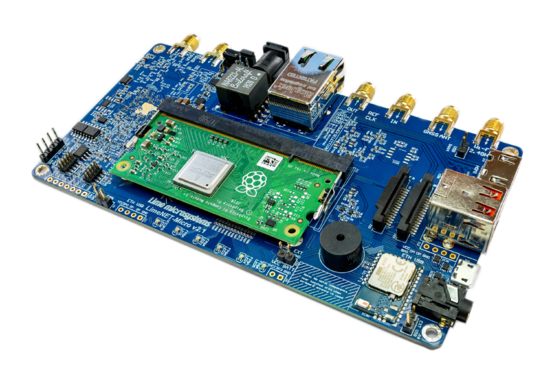LimeNET Micro: Difference between revisions
AndrewBack (talk | contribs) (Created page with "''Stub.'' {{Community}}") |
No edit summary |
||
| Line 1: | Line 1: | ||
'' | == LimeNET-Micro Board == | ||
LimeNET Micro makes deploying wireless networks more accessible than ever before, by extending the LimeNET line of integrated hardware solutions via an ultra-low cost platform that is capable of supporting narrowband systems, such as GSM and IoT wireless standards, in a stand-alone configuration. | |||
LimeNET-Micro v2.1 board | |||
[[File:LimeSDR-Micro_v2.1_board.png|center|550px|LimeNET-Micro v2.1 ]] | |||
== Features and Specifications == | |||
{| class="wikitable" | |||
! Feature !! Description | |||
|- | |||
| RF Transceiver || Lime Microsystems LMS7002M MIMO FPRF | |||
|- | |||
| FPGA || Intel MAX 10 (10M16SAU169C8G 169-UBGA) | |||
|- | |||
| Raspberry Pi || Raspberry Pi CM3(L) | |||
|- | |||
| USB 2.0 controller || FTDI FT601 (connects FPGA to USB2.0 HUB) | |||
|- | |||
| Oscillator || Rakon U7475LF @30.72MHz | |||
|- | |||
| Continuous frequency range || 10MHz - 3.5 GHz | |||
|- | |||
| Bandwidth || Up to 10 MHz | |||
|- | |||
| RF connection || 2 SMA connectors (2 TRX) | |||
|- | |||
| Power Output (CW) || Up to 10 dbm | |||
|- | |||
| Power Supply || Via PoE, external 5V DC connector or microUSB port | |||
|- | |||
| Status indicators || Programmable LEDs | |||
|- | |||
| Dimensions || without connectors 125mm x 65mm | |||
|} | |||
== Getting Help == | |||
If you have questions, the [https://discourse.myriadrf.org/ MyriadRF Discourse] is a best place to ask for help. | |||
== Documentation == | |||
* [[LimeNET-Micro_v2.1_hardware_description | LimeNET-Micro v2.1 hardware description]] | |||
* [[LMS7002Mr3_Calibration_Using_MCU|LMS7002M (Mask 1) Transceiver Calibration]] - LMS7002Mr3 calibration guide, using internal MCU | |||
* [[LimeSDR Made Simple]] - Demystifying using SDR in the real world and programming a simple example with confidence, through bite sized chunks (note that not all examples will work with the Mini, e.g. those using the waveform player) | |||
* [https://github.com/myriadrf/LMS7002M-docs/blob/master/LMS7002M_Data_Sheet_v3.1r00.pdf LMS7002M Datasheet (PDF)] - LMS7002M RF transceiver datasheet | |||
* [https://github.com/myriadrf/LMS7002M-docs/blob/master/LMS7002M_Programming_and_Calibration_Guide_v31r05.pdf LMS7002M Programming and Calibration Guide (PDF)] - LMS7002M programming and calibration guide | |||
== USB Drivers == | |||
'''Windows only''', OSX and Linux users do not need to install drivers for USB support. | |||
Follow driver installation instructions in [[LimeSDR-Mini_driver_installation|Driver Installation Documentation]]. | |||
== Software == | |||
*[[LimeSuiteGUI|LimeSuiteGUI]] | |||
*[[LimeSDR ExtIO Plugin for HDSDR|LimeSDR ExtIO Plugin for HDSDR]] | |||
*[[Gr-limesdr_Plugin_for_GNURadio|gr-limesdr Plugin for GNURadio]] | |||
== FPGA Binaries == | |||
Here are the links to pre-compiled MCU firmware and FPGA gateware (bitstream): | |||
* FPGA [TBD gateware] | |||
== Board Design Files == | |||
Here are links to the schematic, PCB project and BOM: | |||
LimeNET-Micro | |||
* [TBD Schematic (PDF)] | |||
* [TBD PCB project (Altium project)] | |||
* [TBD BOM (XLS)] | |||
== Additional Components == | |||
Here is a list of additional components to be used with LimeNET-Micro board. | |||
* [https://www.raspberrypi.org/products/raspberry-pi-touch-display/ Raspberry Pi Touch Display] | |||
* [https://www.raspberrypi.org/products/camera-module-v2/ Camera Module V2] | |||
{{Community}} | {{Community}} | ||
Revision as of 08:13, 22 March 2019
LimeNET-Micro Board
LimeNET Micro makes deploying wireless networks more accessible than ever before, by extending the LimeNET line of integrated hardware solutions via an ultra-low cost platform that is capable of supporting narrowband systems, such as GSM and IoT wireless standards, in a stand-alone configuration. LimeNET-Micro v2.1 board

Features and Specifications
| Feature | Description |
|---|---|
| RF Transceiver | Lime Microsystems LMS7002M MIMO FPRF |
| FPGA | Intel MAX 10 (10M16SAU169C8G 169-UBGA) |
| Raspberry Pi | Raspberry Pi CM3(L) |
| USB 2.0 controller | FTDI FT601 (connects FPGA to USB2.0 HUB) |
| Oscillator | Rakon U7475LF @30.72MHz |
| Continuous frequency range | 10MHz - 3.5 GHz |
| Bandwidth | Up to 10 MHz |
| RF connection | 2 SMA connectors (2 TRX) |
| Power Output (CW) | Up to 10 dbm |
| Power Supply | Via PoE, external 5V DC connector or microUSB port |
| Status indicators | Programmable LEDs |
| Dimensions | without connectors 125mm x 65mm |
Getting Help
If you have questions, the MyriadRF Discourse is a best place to ask for help.
Documentation
- LimeNET-Micro v2.1 hardware description
- LMS7002M (Mask 1) Transceiver Calibration - LMS7002Mr3 calibration guide, using internal MCU
- LimeSDR Made Simple - Demystifying using SDR in the real world and programming a simple example with confidence, through bite sized chunks (note that not all examples will work with the Mini, e.g. those using the waveform player)
- LMS7002M Datasheet (PDF) - LMS7002M RF transceiver datasheet
- LMS7002M Programming and Calibration Guide (PDF) - LMS7002M programming and calibration guide
USB Drivers
Windows only, OSX and Linux users do not need to install drivers for USB support. Follow driver installation instructions in Driver Installation Documentation.
Software
FPGA Binaries
Here are the links to pre-compiled MCU firmware and FPGA gateware (bitstream):
- FPGA [TBD gateware]
Board Design Files
Here are links to the schematic, PCB project and BOM:
LimeNET-Micro
- [TBD Schematic (PDF)]
- [TBD PCB project (Altium project)]
- [TBD BOM (XLS)]
Additional Components
Here is a list of additional components to be used with LimeNET-Micro board.
| |||||||||||||||||||||